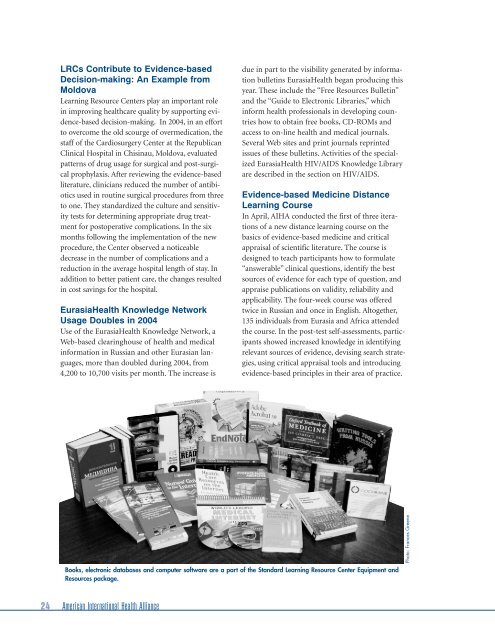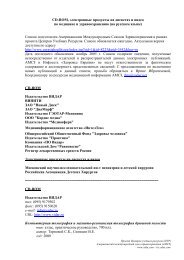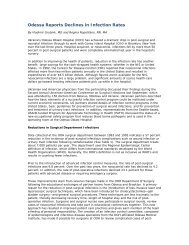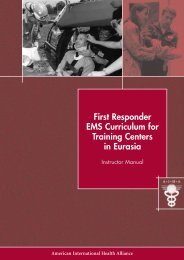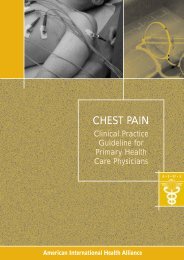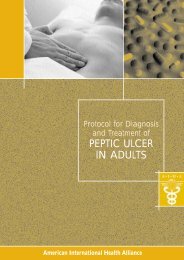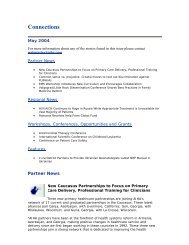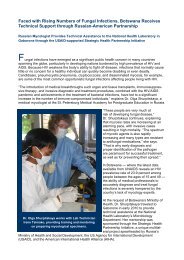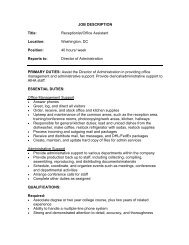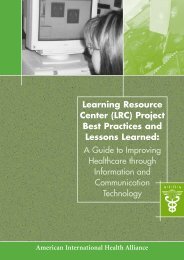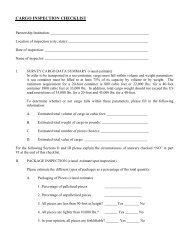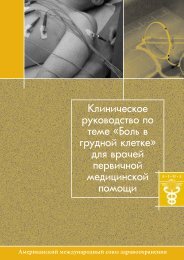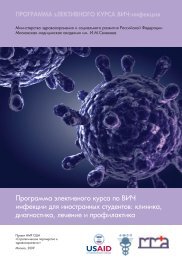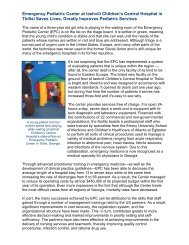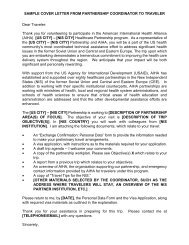Annual Program Report 2004 - American International Health Alliance
Annual Program Report 2004 - American International Health Alliance
Annual Program Report 2004 - American International Health Alliance
Create successful ePaper yourself
Turn your PDF publications into a flip-book with our unique Google optimized e-Paper software.
LRCs Contribute to Evidence-based<br />
Decision-making: An Example from<br />
Moldova<br />
Learning Resource Centers play an important role<br />
in improving healthcare quality by supporting evidence-based<br />
decision-making. In <strong>2004</strong>, in an effort<br />
to overcome the old scourge of overmedication, the<br />
staff of the Cardiosurgery Center at the Republican<br />
Clinical Hospital in Chisinau, Moldova, evaluated<br />
patterns of drug usage for surgical and post-surgical<br />
prophylaxis. After reviewing the evidence-based<br />
literature, clinicians reduced the number of antibiotics<br />
used in routine surgical procedures from three<br />
to one. They standardized the culture and sensitivity<br />
tests for determining appropriate drug treatment<br />
for postoperative complications. In the six<br />
months following the implementation of the new<br />
procedure, the Center observed a noticeable<br />
decrease in the number of complications and a<br />
reduction in the average hospital length of stay. In<br />
addition to better patient care, the changes resulted<br />
in cost savings for the hospital.<br />
Eurasia<strong>Health</strong> Knowledge Network<br />
Usage Doubles in <strong>2004</strong><br />
Use of the Eurasia<strong>Health</strong> Knowledge Network, a<br />
Web-based clearinghouse of health and medical<br />
information in Russian and other Eurasian languages,<br />
more than doubled during <strong>2004</strong>, from<br />
4,200 to 10,700 visits per month. The increase is<br />
due in part to the visibility generated by information<br />
bulletins Eurasia<strong>Health</strong> began producing this<br />
year. These include the “Free Resources Bulletin”<br />
and the “Guide to Electronic Libraries,” which<br />
inform health professionals in developing countries<br />
how to obtain free books, CD-ROMs and<br />
access to on-line health and medical journals.<br />
Several Web sites and print journals reprinted<br />
issues of these bulletins. Activities of the specialized<br />
Eurasia<strong>Health</strong> HIV/AIDS Knowledge Library<br />
are described in the section on HIV/AIDS.<br />
Evidence-based Medicine Distance<br />
Learning Course<br />
In April, AIHA conducted the first of three iterations<br />
of a new distance learning course on the<br />
basics of evidence-based medicine and critical<br />
appraisal of scientific literature. The course is<br />
designed to teach participants how to formulate<br />
“answerable” clinical questions, identify the best<br />
sources of evidence for each type of question, and<br />
appraise publications on validity, reliability and<br />
applicability. The four-week course was offered<br />
twice in Russian and once in English. Altogether,<br />
135 individuals from Eurasia and Africa attended<br />
the course. In the post-test self-assessments, participants<br />
showed increased knowledge in identifying<br />
relevant sources of evidence, devising search strategies,<br />
using critical appraisal tools and introducing<br />
evidence-based principles in their area of practice.<br />
Books, electronic databases and computer software are a part of the Standard Learning Resource Center Equipment and<br />
Resources package.<br />
Photo: Frances Greene<br />
24 <strong>American</strong> <strong>International</strong> <strong>Health</strong> <strong>Alliance</strong>


